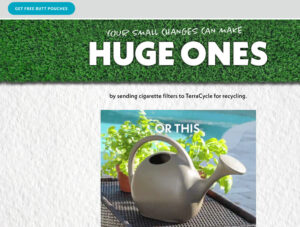Collection: American Spirit Modern
Santa Fe Natural Tobacco Company’s advertising strategy targets the young, progressive and environmentally conscious, by promoting the “organic” and “additive free” nature of its tobacco products. Most of the ads for the tobacco company, contain a combination of these key phrases: “100% additive free”, “made with 100% organic tobacco”, “natural tobacco”, and “natural tastes better.”
The Natural American Spirit ads are designed to communicate to the viewer that there is nothing synthetic or artificial about their cigarettes thereby encouraging tobacco users to believe that the cigarette is superior to others. In reality, there is nothing natural or pure about how the tobacco is processed in cigarettes. The ads rely on a palette of mild, pastel shades that are meant to resemble natural dyes. Most ads display one or more cigarette packs surrounded by a rural setting. For example, several of the ads are of a farm where everything, from the roots and soil to a field of bright sunflowers, is crafted from colored tobacco leaves. Others show green pastures or barren farms with a few tobacco sprouts pushing out of the dirt. In one dramatic version, the cigarette packs themselves are sprouting like crops. These pictures draw nostalgia for the once simple way of life.
The tobacco company also heavily advertises itself to environmentalists through buzz word such as “eco-friendly” and “sustainable.” For instance, ad copy for a Natural American Spirit ad says, “"We grow our premium natural tobacco in a responsible, sustainable way through our earth-friendly and organic growing programs…. Protecting the earth is as important to us as it is to you."
Santa Fe Natural Tobacco company has faced legal action a few times over its advertising claims. In 2000, the Federal Trade Commission filed a deceptive advertising campaign arguing that through their advertisements, “Santa Fe represented that because Natural American Spirit cigarettes contain no additives, smoking them is less hazardous to a smoker's health than smoking otherwise comparable cigarettes that contain additives.” This led to Santa Fe adding the following disclaimer on its packets, “No additives in our tobacco does NOT mean a safer cigarette." A decade later, attorneys general from 33 states and the District of Columbia, reached an agreement requiring Santa Fe to add a disclaimer stating, "Organic tobacco does NOT mean a safer cigarette." The hope was that this warning would alert consumers that natural tobacco does not mean safer tobacco.
However, If popular culture is any clue to how persuasive these disclaimers really are, the answer is no; As recently as 2008, the female protagonist, April (Isla Fisher), in the romantic comedy "Definitely, Maybe" discusses the health benefits she feels she receives when smoking Natural American Spirit cigarettes over Marlboros, the choice of the male protagonist, Will (Ryan Reynolds). When will asks incredulously why she is willing to pay so much for a pack of cigarettes, April responds that "They don't put as many chemicals in them." He pushes, "So those are healthy cigarettes," and she says, "Something like that." She also tells him, as he holds a pack of Marlboros tightly, "They put saltpeter in your cigarettes, which make them burn faster, which make you smoke more." Clearly, perceived health benefits of natural cigarettes are still rampant in mainstream popular culture, a dangerous misconception.
























































































































































































































































